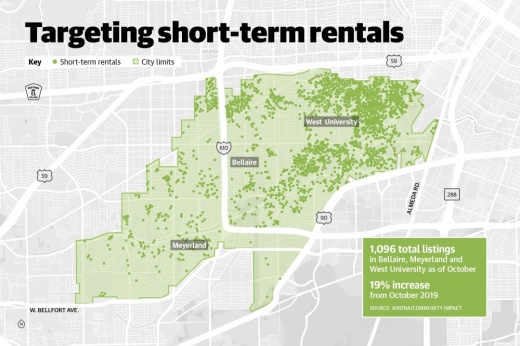During a Nov. 9 public comment session, Houston resident Susan Sajadi recounted an incident where she heard gunshots coming from an Airbnb close to her home and how nothing was done about it.
“Unless there is a body in the street or somebody is killed, that is what it’s going to take to actually get somebody to do something,” she said.
City officials met in April to start the process of gathering information on short-term rentals in Houston, and over the course of nine months have put together a potential plan to regulate the market.
Mapping it out
Bram Gallagher, director of economics and forecasting at AirDNA, a company that analyzes short-term rental data, said Houston markets have experienced a steady rise in short-term rentals over the past five years.
In Bellaire, West University and Meyerland, there were approximately 1,096 listings as of October. In October 2019, there were 920 listings—reflecting a 19% increase.
The most concentrated number of homes rented out were in the 77030 ZIP code, near the Texas Medical Center. The most available units across all five ZIP codes contain one or two bedrooms.
“It’s not incredibly shocking or dramatic growth over the last five years, but it’s strong year-over-year growth,” Gallagher said.
However, while he said listings have not increased significantly, the revenue has doubled in the last five years. In October 2019, 920 listings brought in about $760,000 in revenue with a 53% average occupancy rate, which is the percentage of available space that is being used. In 2024, the 1,096 available listings accumulated $1.44 million with the same occupancy rate.
Gallagher said the increase in revenue is attributed to a rise in rates. In the five ZIP code areas, the average daily rate is $182.74 per night, according to AirDNA data.What's being done
After a public comment session in March where nearly 40 residents had complaints on STRs, City Council members Sallie Alcorn and Amy Peck requested the administration evaluate the feasibility of registering or permitting STRs in Houston.
By April, the Administration and Regulatory Affairs Department started to gather data and facts to develop potential regulations. Julian Ramirez, Quality of Life Committee chair and an at-large council member, said regulations could require STR owners to register their properties with the city.
“Hosts will be required to keep the registration current and will have to pay insurance and a fee of some kind,” he said. “If they fail to do any of these things, there will be a penalty between $100-$500 for each violation.”
Ramirez said there could also be provisions under which a registration can be revoked, including:
- If false information was provided in the application
- If important changes were not reported to the city
- If there are two or more instances when the city had to lessen a nuisance
- If there are two or more citations that resulted in two or more convictions for violations
- If someone who is staying at an STR or the owner was convicted of a listed criminal offense
The proposed regulations need to be approved by Houston City Council before moving forward and are subject to change.
In comparison
In city's surrounding Houston, short-term regulations differ. Some cities ban the practice altogether while others might have no regulations at all.
In West University Place, it is illegal for properties in residential districts to be rented for less than 30 days.
According to the ordinance, the owners of homes being rented out in West U's residential districts must pay hotel occupancy taxes and those renting out homes in nonresidential districts must purchase a rental permit, provide sketches of floor plans and provide proof of insurance.
Meanwhile, Bellaire does not have a specific ordinance prohibiting or regulating short-term rentals.
The city's ordinance requires a certificate of occupancy for all occupants prior to the house being leased and the occupant or the landlord must come to the Development Services Office and apply for a certificate.
What they're saying
Houston City Council members Abbie Kamin, District C, and Sallie Alcorn, at-large position 5, both said while the city is looking to regulate the short-term rental market, they are not looking to restrict homeowners too much.
“I am in favor of reasonable regulations that do not impede on the average Houstonian’s ability to rent their homes, but we have to find a way to address the bad actors that are creating a problem for everyone," Kamin said.
Alcorn echoed her statement.
“We don’t want to discourage the responsible short-term rental owners, and I think these regulations won’t, but this is a way for the city to have some kind of control," she said.
Measuring the impact
Jackie McGraw, a communication specialist for rental platform Airbnb, said Airbnb brought in more than 1.8 million guests to the city and contributed an estimated $1.6 billion in economic activity in 2023, including producing over $400 million in tax revenue.
In Texas, STR owners must pay 6% of the cost of a room to the state’s hotel occupancy tax. Airbnb data for 2023 shows nearly $9 million was collected in Houston in local lodging and hotel taxes contributed by hosts.
The average host in Houston also earned approximately $8,700 in supplemental income in 2023, according to the same data.
A 2023 Airbnb survey of Houston showed:
- 56% of hosts used the additional income to keep up with the rising cost of living.
- 42% used the money to cover food and other basic expenses.
- 10% said it helped them avoid eviction or foreclosure.
The proposed short-term rental regulations will return to the Quality of Life Committee on Dec. 9 at 2 p.m. for discussion. The meeting is open to the public and will include an opportunity for public comment.
Ramirez said once a draft is finished, the proposal will need to be placed on a future City Council agenda. He said the committee is aiming to have the final regulations presented to the council by the end of 2025 or early 2026.





